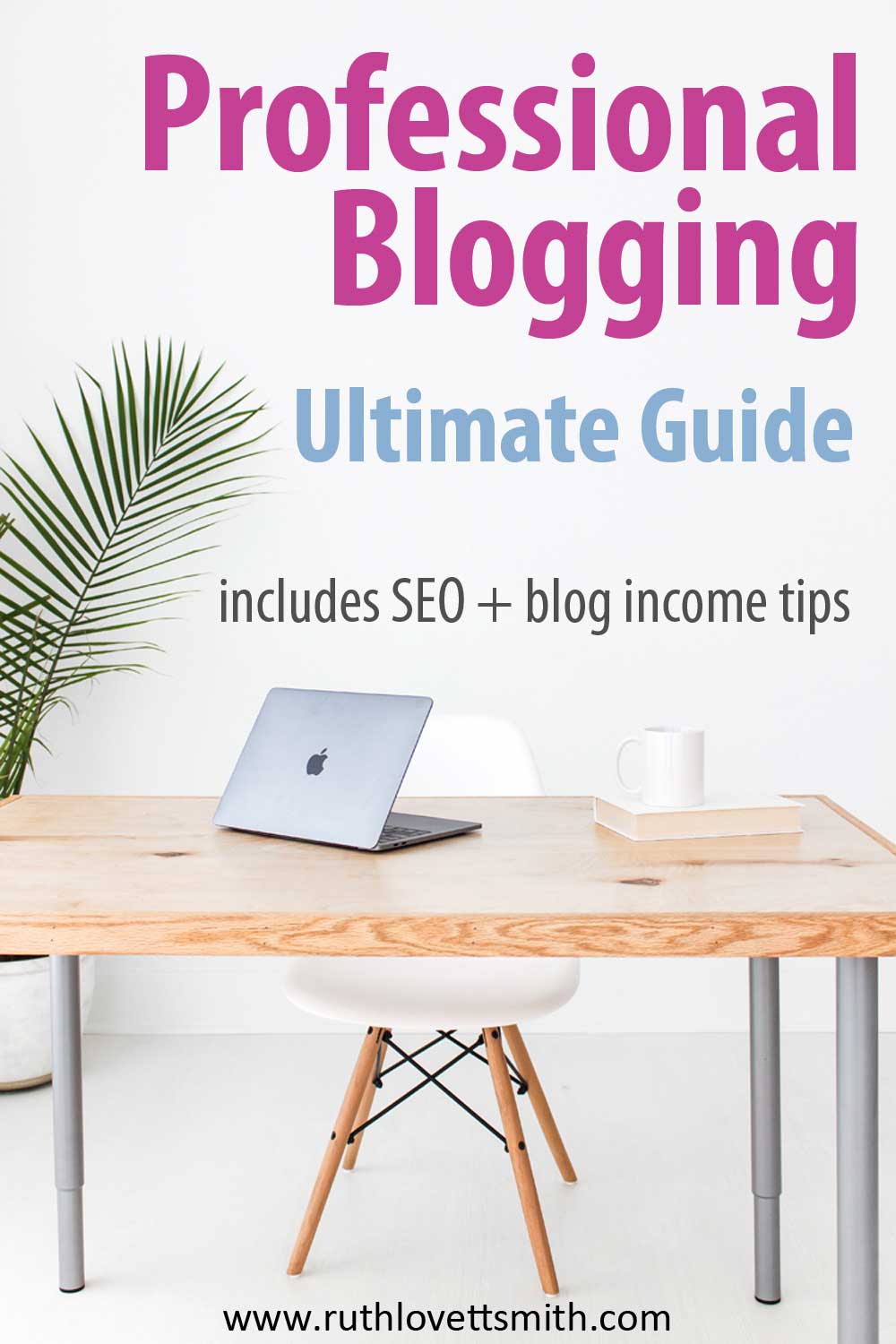Professional Blogging: Ultimate Blogger’s Guide
This post may contain affiliate links. For more information, see my full disclosures here.
Are you interested in professional blogging? This ultimate professional blogging guide covers how to become a blogger and get paid, how to make money blogging, professional blogger salary information, how to create quality content, SEO tips, and more.

What is Professional Blogging?
A professional blogger is someone who makes a living blogging. This means that blogging is their sole (or majority) source of income. This income might come from sponsored posts, advertising, affiliate marketing, consulting, coaching, or their own products.
Professional blogging is work. However, you can make money with your blogging if you are:
- A hard worker.
- Persistent
- A hard worker.
Notice a theme here?
Many people think professional blogging is as easy as putting up a blog and writing, on occasion. Ask any professional blogger and they’ll tell you differently. Professional blogging takes time and a plan.
Most of the top professional bloggers (making 6 figure incomes) worked for years making nothing. They worked on their blogs for hours on end, after their normal 9 to 5 jobs. They treated their blog like a second job or even better; like a business.
Whether you’ve just started your blog, or whether you’ve been blogging for a while now, you can make money as a professional blogger if you are willing to put in the work.
How Much do Professional Bloggers Make?
According to Indeed.com, the average blogger makes $37,073 a year. Of course there are some bloggers that make well over six figures a year, and many bloggers that make nothing.
The key to making money as a professional blogger is to have a detailed plan of action. Most professional bloggers are very strategic with how they run their blog and business. Those who have a plan, and treat their blog like a full time business, bring in up to six figures or more a year. Those who hobby blog, blog about random topics, or blog for fun; often don’t make a living blogging.
How do I Become a Professional Blogger?
In order to become a professional blogger you need to not only create a blog; you also need to educate yourself on how to choose a niche, name your blog, create content, drive traffic to your content, market your blog, and sell.
Here are the most important skills all professional bloggers should master:
- Write engaging and effective content.
- Search engine optimization (SEO).
- Networking, marketing, and sales.
- Tenacity and consistency.
We’ll discuss these four important skills in more detail below.
How to Build a Professional Blog

First and foremost, to become a professional blogger; you need a blog.
If you are interested in professional blogging, but haven’t set up a blog yet; see my post How to Start a Blog to get yours up and running quickly.
Once you have your blog up and running, you’ll want to put some work into creating pages and then posts. The link above will give you additional resources and links to help you here on my site.
Assuming you already have a blog up and running, let’s talk about what how to turn you from blogger into professional blogger.
A blogger is someone who blogs. A professional blogger is someone who gets paid to blog. There are numerous ways to get paid as a professional blogger. However, those ways only work if you are good at professional blogging.
Professional blogging takes more than writing a random blog post. You have to have a content plan in place, and deliver quality content to your readers. In addition, you need to be able to write engaging and effective blog posts well.
How to Choose a Blog Niche
To go from blogger to professional blogger you should:
- Blog within a particular niche.
- Know your readers needs and desires.
- Deliver quality content that meets those needs and desires.
Why choose a niche? When you “niche down” you make it easier on yourself to create very specific content. You also end up building a blog for a very specific audience.
For example, you could create a “parenting” blog OR you could create a parenting “newborns”, “toddlers”, “preschoolers”, etc. blog. Choosing to focus on toddlers, for example, helps you to write for a very specific audience. Instead of competing with every parenting blog out there, you become THE resource for parenting toddlers.
Of course you should choose a niche that you can sustain interest in. Professional blogging takes time, and you don’t want to tire of your topic and niche too quickly.
If you don’t want to choose a niche, know that making money blogging will likely take longer.
For more information on niche blogging, see my post Niche Website Ideas.
How to Choose a Blog Name
When it comes to choosing a blog name, you have a couple of options.
You can choose a niche related name that will help readers to know what your blog is about. You can blog under your own name, which is common for writers and artists. Or you can choose a creative and unique name that has meaning to you.
Should you choose your own name, or a unique name, know that it will take more marketing on your part to get your audience to understand what you blog about. Choosing a clever niche name can go a long way towards getting others to notice your blog.
For more tips on choosing a name, see my post Creative Blog Names.
How to Create Quality Content
Quality content is engaging and effective. What this means is that your writing keeps your reader interested and often encourages them to do something. The “something” could be to click on an ad, sign up for your email list, read another post, etc. It’s important to learn how to do this naturally vs an over the top high sales pitch way.
It’s also important to create content that solves a problem for your readers. This builds trust and keeps your readers coming back for more.
For example, if you are a recipe blogger; you might want to offer posts on ingredient substitutes. How to substitute for butter or milk, in a recipe, might be helpful to someone with a dairy allergy. You are solving a problem for them, and building trust with them.
If all of this sounds like a ton of work, or if you only want to blog about your kids, pets, and vacations; professional blogging is probably not for you. You can still blog. Just don’t expect to make a professional blogger salary.
plan quality content fast
Blog Post Planner Printable
Plan your content quickly and easily with this blog post planner printable. The blog post outline helps you to come up with topics, titles, headlines, keywords, and more. Download and use it today!
How to Drive Traffic to Your Blog
The key factor in making the most money, with any blog, is site traffic. This is why it’s important to have a content plan in place.
A basic content plan involves coming up with an idea that solves a problem for your reader. Doing keyword research so that your post ranks in search engines. Then writing a long form post that includes images and appropriate links as necessary. (See the SEO tips section below for more information.)
A more detailed content plan involves an outline.
- Your niche.
- Subcategories within your niche. (Also known as silos.)
- Posts, and keywords, within each subcategory.
- Your cornerstone content.
For example:
- Niche: Parenting Toddlers.
- Subcategories: Toddler Crafts and Activities, Toddler Diet and Recipes, Toddler Toys and Games.
- Posts: numerous posts with keywords related to, and filed under, each category.
- Cornerstone Content: 1 long form post on each of the above subcategories.
Creating a content plan helps you to identify reader problems/needs, helps you to create effective and engaging posts, and naturally builds a niche site over time.
Professional Blogging Tip: Create Cornerstone Content
Creating cornerstone content can have a huge impact on your blog. Think of cornerstone content as the top content you want your audience to read first. Depending on the size of your blog, this could be 3 to 5 main posts or pages.
These posts should include everything about a particular topic, for example “Toddler Crafts and Activities”, and should be the main post that all other posts in the category/silo link back to.
You should create your cornerstone content with your main keywords in mind. The goal being for this large post to rank on the first page in search engines for those keywords. Ideally, you should also link to your cornerstone content from your home page. This shows search engines that these are your top pages.
In short, think of your cornerstone content as “Ultimate Guides”.
Increase Traffic Tips
Does your blog get a good amount of traffic? (You can figure this out by signing up for a Google Analytics account.) It could take as little as 2,000 unique visitors a month to start making money. As your site grows, traffic will increase and so will your income.
If you don’t have any site traffic, you have work to do.
- Create a content plan.
- Start writing blog posts regularly.
- Make sure you create lasting and useful content known as evergreen content.
- Start connecting and sharing more on social networking sites.
- Look into guest posting to gain backlinks to your site.
If this all seems overwhelming, take a deep breath. As I mentioned above, professional blogging is hard work. However, it can also be so much fun. To avoid overwhelm, take each step one at a time.
an All in one blog planner
Printable Blog Planner and Canva Template
Plan out your blog content. Track your keywords and social media stats. Keep track of your blog finances, expenses, and more. This printable blog planner comes with Canva template access so that you can edit it to suit your needs.
Search Engine Optimization Tips
Search engine optimization is the process of optimizing your blog, blog posts, and pages to make them easier to find by search engines. If you follow certain SEO guidelines, you may be rewarded by getting a high ranking post. The higher your posts rank, the more traffic you’ll receive. The more traffic you receive, the more money you will make.
The trouble is, SEO guidelines are constantly changing, and search engines are always creating new algorithms to determine what posts and sites should rank. So, what can you do?
Create engaging content that solves the problems of your audience.
I can not stress enough how important it is to think of your audience first. Write like you are speaking to your audience, vs search engines. This means writing naturally and using keywords. However, refrain from keyword stuffing your posts.
As I mentioned above; create a blog outline, content plan, and cornerstone content. Create a list of keywords, and longtail keywords, that come naturally when thinking about your niche. For example, “toddler crafts” is a keyword and “cute toddler crafts for boys” is a longtail keyword.
If you put the work in, your site traffic will grow. Once you have a reasonable amount of site traffic, you can start thinking about ads and affiliate programs.
For more SEO tips, see my post on Search Engine Optimization.
Professional Blogging Revenue Streams

The great thing about professional blogging is that there are numerous ways to make money. You can focus on one, or on many. However, most bloggers choose several different revenue streams.
Choosing multiple revenue streams helps to ensure that you are always making money. If one revenue stream is slow, you still have others to fall back on.
Following are some of the ways that professional bloggers make money.
Private Advertising and Advertising Networks
You can sell private ads on your website, join advertising networks, or do both. There are pros and cons to each. You’ll need to know your site traffic stats to determine how much you can expect to make.
Private Advertising
The benefit of private advertising is that you work out the ad rate, size, etc. with the person placing the ad on your site. The downside to private ads is that they require time. Time in working with the advertiser, and maintaining their needs. Time in billing, and maintaining the ad. I’ve found the easiest system is to charge a per month flat fee. If the ad is placed above the fold, higher on the blog page, the ad rate is more.
Advertising Networks
Advertising networks (like Google AdSense, Media.net, Mediavine, AdThrive, etc. ) take care of the above work for you. However, payment is usually per ad click (CPC) or per impressions (CPM). Impressions means the number of times an ad shows up on your blog. The average CPM for Google Adsense is between $1 and $1.5 per 1,000 impressions. If you have a lot of traffic coming in to your blog, the clicks and impressions can add up. But if you don’t have a lot of traffic, you won’t make a lot of money with an ad network.
Affiliate Marketing and Affiliate Programs
Another way to make money on your blog is through an affiliate program. With an affiliate program, you place ads or links on your site and earn money when someone purchases an item through your link.
Amazon Associates
A popular affiliate program to start with is the Amazon Associates Program. You can make money with Amazon. However, it does take time. Currently Amazon only offers a 24 hour cookie. That means that your reader has 24 hours to purchase something, after clicking on your affiliate link. If they save the item and purchase it 2 days later, you won’t receive a cent.
ShareASale
Many bloggers also join the ShareASale affiliate program. It is easy for new bloggers to join, and there are numerous merchants to work with. Once you’ve signed up with ShareASale, search through their various merchants and find the ones that are relevant to your site and fit your niche.
Have a favorite course or e-book that has worked well for you? Contact the writer and find out if they have an affiliate program. Many books, guides, and courses do.
For additional affiliate programs you can join, see my post High Paying Affiliate Programs.
Affiliate Marketing Tips
The key with affiliate programs is that they take more work than simply placing an ad on your blog, and then forgetting about it. The best way to use affiliate programs is to find a product that fits your blog, or niche, and then create a post around it.
For example, if you run a gardening blog; you may want to find gardening books or products on Amazon, and then write product reviews. Or consider writing holiday gift guides; like Best Gifts for Mother’s Day.
Affiliate marketing involves part traffic and part selling. If your site has a lot of traffic, you may make more money. If your site doesn’t have a lot of traffic, but you are good with writing sales copy, you may make more money.
To make the most out of affiliate marketing, look for products that offer a higher percentage payout. Some companies/products will offer 5%, while others will offer as much as 20%. This means an affiliate sale could be as low as a few dollars, or as much as hundreds of dollars.
Sponsored Posts
Some bloggers choose to do sponsored posts on their blogs. Sponsored posts are posts that are paid for – “sponsored” by a specific company.
Some bloggers write the post themselves, and some companies want specific content that they write in house. For example, a coffee company might sponsor a recipe post on a cooking blog if it features how to make coffee ice cream using their coffee. The recipe post might also include a quick blurb about the coffee company and why their coffee is the best for that recipe.
Sponsored post pay depends on your site’s audience and traffic stats. However, keep in mind that sponsored posts are a one and done deal. You are paid once, and the post remains on your site. Therefore, how much you charge should depend on whether you write the post, and the consideration that the sponsorship is a permanent ad within the post.
Social Media Sponsorship
Bloggers with large social media followings can often earn cash, for product or company mentions, on their social media channels as well. Some companies hire bloggers to participate in promoting new products or giveaways. The key here is to have a large and engaged social media following. The higher your follower count, the more you can charge per social media post. Influencers with less than 10,000 followers make, on average, $88 per post. Influencers with more than 10,000 followers make $200+ per post.
Blogger Products and Services
So far we’ve covered how to make money from other companies. However, many bloggers choose to offer their own products, or services, for a fee. The list here is endless, and you are only restricted by your own imagination.
Craft bloggers can create how to guides, printables, clip art files, and more. Sewing, quilting, and yarn artists can create patterns for sale. Parenting bloggers can create activity guides, recipe guides, and a variety of tutorials.
The key here is that how much you make does not depend on your blog traffic numbers. This is where growing an audience, and solving their problems, comes in. If 1,000 people buy a $100 product, that equals $100,0000. Let that sink in for a moment.
Paying Taxes as a Professional Blogger
In the United States freelance professional bloggers pay taxes on their income. You might even need to pay taxes quarterly. It’s your responsibility to keep track of your annual income, as well as where it comes from. You can do this in a notebook, planner, text document, or in a spreadsheet.
Tax Write-offs for Bloggers
While no one likes to pay taxes, bloggers can often write off business expenses related to their work. Things like office supplies, books and magazines, association fees, and more. Keep any and all receipts related to your blogging business. It will surprise you when you see the number of items you can write off come tax time.
Want an easy way to keep track of your finances? You can manage your income, and your expenses, with my preformatted spreadsheets. They are specifically for bloggers and small business owners. This is the system I use for my own business.
The easy Way to Keep Track of Your Finances
Spreadsheets for Income and Expenses
Manage your finances easily with my preformatted spreadsheets for income and expenses. This product includes 9 spreadsheets and 1 printable, with an Excel and Google Sheets option. Simply shop and download to get started.
Network, Marketing, and Sales Tips
I mentioned above some key skills to have. Here we’ll talk about networking, marketing, and sales. These three things are important if you want to be successful as a professional blogger.
How to Network
Networking means reaching out and interacting with others to exchange information and develop professional contacts. Networking can help you to spread the word about your blog and blog content. It can also be a great way to build a community of bloggers that you can collaborate with.
The best way to network with other bloggers is via social media. The best strategy is to find bloggers in related niches. For example, if you blog about vegetable gardening; reach out to homesteading blogs, recipe blogs, or flower gardening blogs. Comment on their blog and social media posts. Reach out via email and introduce yourself. Tell them how much you love their work, and ask if they’d be interested in a collaboration. Think of these connections as your blogging tribe. How can you help each other?
How to Market and Sell
Marketing is the act of promoting and then selling something. When you market yourself, you are selling yourself. When you market your blog, you are selling your blog. The key to marketing is to have a firm grasp on what your blog represents and who your audience is. What do you provide to your audience? What are your audience’s pain points? How can you solve those pain points? What is your solution? When you figure those things out; you can successfully market your blog and products.
Top Professional Blogger Traits
When it comes to professional blogging, there are numerous traits that are important to have. In my opinion, the most important traits to have are tenacity and consistency. Most bloggers fail due to a lack of both. They get excited at first, and then life gets in the way.
To truly be successful, you need to be tenacious. You need to put your head down and grind, even when you don’t want to. You need to treat your blog like a business, and set business hours for yourself.
Consistency is equally important. You can’t be tenacious for one day, take a week off, and expect to be successful. You need to work at it every single day. The more consistent you are, the more you’ll see results.
Set up milestones for yourself to keep engaged. Create goals and a blog business plan.
Rules of Professional Blogging

It’s important to know that professional blogging comes with some rules and red tape. There are numerous laws to follow as it pertains to blogging, advertising, and affiliate marketing.
Affiliate Program Guidelines
When you sign up with advertising and affiliate companies; you will often be required to review their terms of service, and potentially additional contracts. Be mindful of the rules of any advertising network, or affiliate program, you join. Read all of the fine print to ensure you are working within their guidelines.
FTC Guidelines
The Federal Trade Commission is an organization put in place to protect America’s consumers. You’ll want to make sure you are up to date on any and all FTC guidelines put forth regarding blogs and bloggers. A general rule is to disclose any time a link or image is part of an advertising network or affiliate program. You can find more information regarding this by clicking on FTC Disclosures.
GDPR Guidelines
GDPR stands for General Data Protection Regulation and pertains to data privacy laws across Europe. If you have web traffic coming from countries in the European Union, you need to comply with GDPR guidelines or you may be fined. This involves setting up subscriber consent options, when collecting email addresses, and making sure your blog is GDPR compliant. You can do this by creating several policy pages on your blog.
- Privacy Policy
- Terms and Conditions Policy
- Cookie Consent
This is a general overview on GDPR. As I’m not an attorney, do not take this as legal advice. Do an internet search for GDPR and blogging to find more information on how you can make sure your blog is compliant.
Creating a Legal Company
Different types of companies, and corporations, come with different types of liability protection. For example, a Limited Liability Company often protects the owner’s personal assets. Most beginner bloggers do not create a formal company, such as an LLC, right away. However, you may want to speak with an attorney, or tax professional, to determine what is right for you and your blogging business.
Professional Blogging Conclusion
I hope you have found this post helpful. Professional blogging can be a great way to build your own business and work for yourself. The key to being a successful professional blogger is to always treat your blog like a business.
Take Your skills to the Next Level
Get Paid MORE to Write, Blog, and Create
How to Make MORE Money with Your Craft is a deep dive into all of the ways that writers, bloggers, artists, and creatives make money. It’s jam-packed with information, tips, as well as links to numerous money making resources and ideas.
Looking for more blogging tips? Click on Blogging Tips and Tricks to be taken to the blogging hub of my website. There you’ll find more tips and articles to help you grow your hobby, business, blog, and brand.
If you enjoyed this post, please share it with your friends via your social media channels? Have a question or tip? Share it in the comments section.


Great tips. Keep it up.
Thanks so much, I sincerely appreciate it!